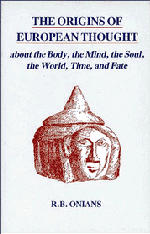Book contents
- Frontmatter
- Contents
- Preface to the first edition
- Preface to the second edition
- Introduction: The Earliest Greeks
- PART I THE MIND AND THE BODY
- Chapter I Some Processes of Consciousness
- Chapter II The Organs of Consciousness
- Chapter III The Stuff of Consciousness
- Chapter IV Cognition—The Five Senses
- Chapter V The Liver and the Belly
- PART II THE IMMORTAL SOUL AND THE BODY
- PART III FATE AND TIME
- ADDENDA
- Indexes
Chapter IV - Cognition—The Five Senses
Published online by Cambridge University Press: 06 August 2010
- Frontmatter
- Contents
- Preface to the first edition
- Preface to the second edition
- Introduction: The Earliest Greeks
- PART I THE MIND AND THE BODY
- Chapter I Some Processes of Consciousness
- Chapter II The Organs of Consciousness
- Chapter III The Stuff of Consciousness
- Chapter IV Cognition—The Five Senses
- Chapter V The Liver and the Belly
- PART II THE IMMORTAL SOUL AND THE BODY
- PART III FATE AND TIME
- ADDENDA
- Indexes
Summary
The dead prophet has ϕρένες, lungs, and πέπνυται, has breath, intelligence. It is by the θυμός in his ϕρένες or by what is breathed into them by some god that a live prophet divines. Athene and Apollo agree to stop the battle by setting Hector on to single combat, ‘and Helenos, Priam's dear son (a prophet), understood (lit. “put together for himself”, σύνθετο) in his θυμός their counsel’. The perception is taken into the θυμός and is there correlated with the rest by the ϕρένες. An eagle drops a snake among the attacking Trojans—a portent from Zeus—and Polydamas interpreting to Hector says: ‘Thus would a prophet expound who had clear knowledge of portents in his θυμόςʾ (σάϕα θυμῷ εἰδείη τεράων). Aeschylus has the word θυμόμαντις and describes how Apollo is inspired as a prophet τέχνης δέ νιν ζεὺς ἔνθεον κτίσας ϕρένα. Cf. Enn. Ann. 18, fari donavit divinum pectus habere. θυμός is vapour from liquid, and liquid drunk goes to the ϕρένες or lungs. Hence it is, we may guess, that prophetic inspiration was sought by inhaling vapour, or by drinking blood or water, or wine or honey, or by chewing (i.e. extracting the essence in liquid), not eating, the divine plant; hence that the Muses were water-nymphs, and poets drank of their springs on Helicon or Parnassus, Castalia, etc. and τῷ μὲν ἐπὶ γλώσσῃ γλυκερὴν χείουσιν ἐέρσην/τοῦ δʾ ἔπεʾ ἐκ στόματος ῥεῑ μείλιχα (Hes. Theog. 83 f.) and a poem was water, honey or nectar of the Muses.
- Type
- Chapter
- Information
- The Origins of European ThoughtAbout the Body, the Mind, the Soul, the World, Time and Fate, pp. 66 - 83Publisher: Cambridge University PressPrint publication year: 1988

